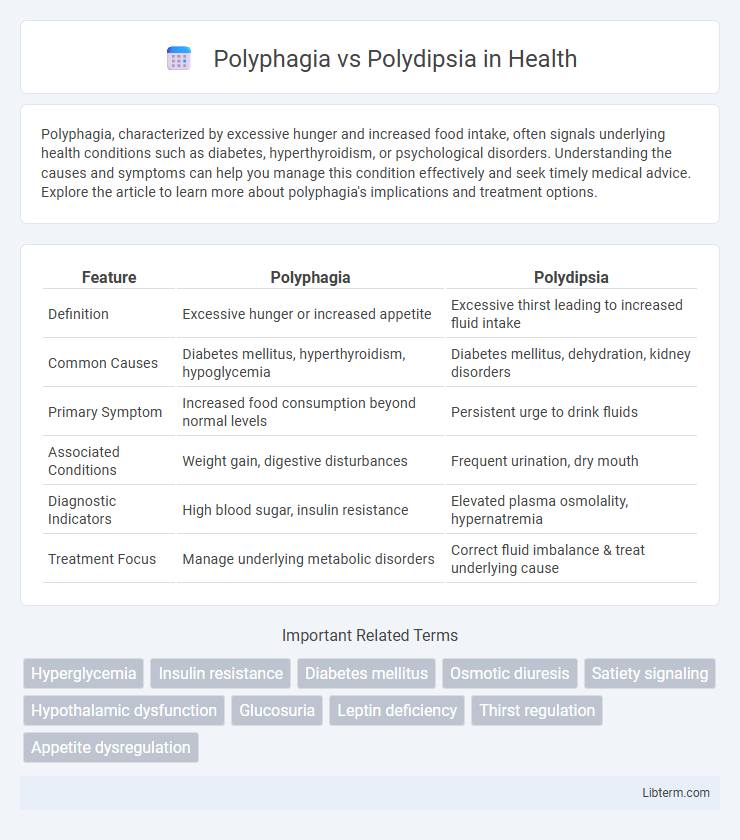Polyphagia, characterized by excessive hunger and increased food intake, often signals underlying health conditions such as diabetes, hyperthyroidism, or psychological disorders. Understanding the causes and symptoms can help you manage this condition effectively and seek timely medical advice. Explore the article to learn more about polyphagia's implications and treatment options.
Table of Comparison
| Feature | Polyphagia | Polydipsia |
|---|---|---|
| Definition | Excessive hunger or increased appetite | Excessive thirst leading to increased fluid intake |
| Common Causes | Diabetes mellitus, hyperthyroidism, hypoglycemia | Diabetes mellitus, dehydration, kidney disorders |
| Primary Symptom | Increased food consumption beyond normal levels | Persistent urge to drink fluids |
| Associated Conditions | Weight gain, digestive disturbances | Frequent urination, dry mouth |
| Diagnostic Indicators | High blood sugar, insulin resistance | Elevated plasma osmolality, hypernatremia |
| Treatment Focus | Manage underlying metabolic disorders | Correct fluid imbalance & treat underlying cause |
Understanding Polyphagia and Polydipsia
Polyphagia refers to excessive hunger or increased appetite often linked to conditions such as diabetes mellitus or hyperthyroidism, signaling the body's need for more energy. Polydipsia involves excessive thirst and fluid intake, frequently associated with disorders like diabetes insipidus and uncontrolled diabetes mellitus. Understanding these symptoms aids in early diagnosis and management of underlying metabolic or endocrine abnormalities.
Definitions: What Are Polyphagia and Polydipsia?
Polyphagia refers to excessive or abnormal hunger and increased food intake, commonly seen in conditions like diabetes mellitus and hyperthyroidism. Polydipsia is characterized by excessive thirst and fluid intake, often associated with diabetes insipidus and uncontrolled diabetes mellitus. Both symptoms serve as important clinical indicators for underlying metabolic or endocrine disorders.
Key Differences Between Polyphagia and Polydipsia
Polyphagia is characterized by excessive hunger and increased food intake, often linked to conditions like diabetes mellitus or hyperthyroidism. Polydipsia involves abnormal excessive thirst and fluid intake, commonly associated with diabetes insipidus or poorly controlled diabetes mellitus. The key difference lies in Polyphagia relating to hunger sensations and eating behavior, whereas Polydipsia pertains to thirst and fluid consumption patterns.
Common Causes of Polyphagia
Polyphagia, characterized by excessive hunger and increased food intake, commonly arises from conditions like uncontrolled diabetes mellitus, hyperthyroidism, and certain psychiatric disorders such as bulimia nervosa. Increased metabolic demand and hormonal imbalances, especially involving insulin and thyroid hormones, drive the heightened appetite seen in polyphagia. Unlike polydipsia, which involves excessive thirst, polyphagia primarily reflects disruptions in energy regulation and glucose metabolism.
Common Causes of Polydipsia
Polydipsia, characterized by excessive thirst and fluid intake, commonly arises from conditions such as diabetes mellitus, where high blood sugar levels trigger dehydration and thirst. Other frequent causes include diabetes insipidus, marked by an impaired kidney response to antidiuretic hormone, and psychogenic polydipsia, often associated with psychiatric disorders. Unlike polyphagia, which involves excessive hunger, polydipsia specifically relates to disturbances in fluid balance and kidney function.
Symptoms and Clinical Presentation
Polyphagia presents as excessive hunger and increased food intake, often linked to conditions like diabetes mellitus or hyperthyroidism, characterized by persistent appetite despite adequate nutrition. Polydipsia manifests as excessive thirst and increased fluid intake, commonly associated with diabetes insipidus or uncontrolled diabetes mellitus, with symptoms including dry mouth and frequent urination. Both symptoms can overlap in metabolic disorders but require distinct clinical evaluation to determine underlying causes.
Diagnostic Approaches
Polyphagia and polydipsia, symptoms commonly linked to diabetes mellitus, require distinct diagnostic approaches to determine their underlying causes. Polyphagia evaluation involves comprehensive glucose tolerance tests and hormonal assays to assess insulin levels and detect potential metabolic imbalances. Polydipsia diagnosis often includes serum osmolality measurement, electrolyte panels, and water deprivation tests to rule out diabetes insipidus and other disorders related to abnormal thirst regulation.
Associated Medical Conditions
Polyphagia, characterized by excessive hunger, is commonly associated with conditions like diabetes mellitus, hyperthyroidism, and certain psychiatric disorders such as Prader-Willi syndrome. Polydipsia, defined as excessive thirst, is frequently linked to diabetes insipidus, uncontrolled diabetes mellitus, and psychogenic polydipsia. Both symptoms indicate underlying metabolic or endocrine imbalances requiring thorough medical evaluation for accurate diagnosis and effective treatment.
Treatment and Management Strategies
Polyphagia treatment centers on regulating blood glucose levels through insulin therapy and dietary modifications, especially in diabetic patients. Polydipsia management involves addressing underlying causes such as dehydration or endocrine disorders, with fluid replacement and medication adjustments. Both conditions require continuous monitoring and lifestyle changes to prevent complications and improve patient outcomes.
When to Seek Medical Attention
Persistent polyphagia, characterized by excessive hunger despite adequate food intake, may indicate underlying conditions like diabetes mellitus or hyperthyroidism requiring prompt medical evaluation. Polydipsia, marked by abnormal thirst and excessive fluid intake, can signal dehydration, diabetes insipidus, or uncontrolled diabetes mellitus, necessitating immediate consultation if accompanied by other symptoms such as frequent urination or fatigue. Seek medical attention if these symptoms are sudden in onset, severe, or associated with weight loss, confusion, or visual disturbances to ensure accurate diagnosis and timely treatment.
Polyphagia Infographic

 libterm.com
libterm.com